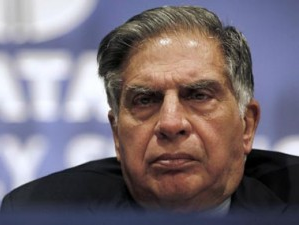Ratan Tata has, in uncharacteristically candid comments about fellow tycoon Mukesh Ambani’s lifestyle , pointed to the latter’s luxurious 27-storeyed mansion in Mumbai as a glaring sign of income disparity in India – and the stuff that “revolutions are made of.”
“It makes me wonder why someone would do that. That’s what revolutions are made of,” Tata told Damian Whitworth of The Times of London in an interview published on Saturday.
The money quote that is certain to echo in business circles for a long while:
“The person who lives in there should be concerned about what he sees around him and [asking] can he make a difference. If he is not, then it’s sad because this country needs people to allocate some of their enormous wealth to finding ways of mitigating the hardship that people have.”
Ambani’s swank residence – the world’s first billion-dollar home – has of course drawn reams of (mostly gushing) media attention. Criticism of its over-the-top opulence has so far come only from commentators like Ramachandra Guha and filmmakers like Prakash Jha. For someone of Tata’s stature to point to the lifestyle of one of India’s richest industrialists as reflecting the larger social inequity is striking.
In the interview to Whitworth, Tata also hints that Noel Tata, his half-brother, may not have what it takes to take over the reins as the head of the Tata empire next year. “I think if he is to run this he should have greater exposure than he has had. Partly his not having it has been his own choice,” Tata noted.
Asked if he regretted he had no children to whom he could pass on the baton, Tata says that if he had had a family, he would probably not have been able to devote as much of his time to the organisation as he had. But he says it would have “bothered” him to think that if he’d had a son, he would automatically have been considered as a natural successor.
“I would have probably done something not to have that happen, and my son would have felt I was prejudiced against him. I wouldn’t have wanted it to be automatic,” Tata said.
Some of the other points that Tata makes in the interview:
The UK and the US have a “work ethics” problem among senior management, which is dragging them down.
“It’s a work ethic issue,” he says. “In my experience, in both Corus and (Jaguar), nobody is willing to go the extra mile, nobody. I feel if you have come from Bombay to have a meeting and the meeting goes till 6pm, I would expect that you won’t, at 5 o’clock, say, ‘Sorry, I have my train to catch. I have to go home.’ Friday, from 3.30pm, you can’t find anybody in their office.”
He contrasts that with the situation in India, where “if you are in a crisis, if it means working to midnight, you would do it. The worker (at Jaguar) seems to be willing to do that; the management is not.”
by the FB team

1 comment:
I agree with Ratan Tata whole heartedly. I believe we donot do enough for our country. I am an Indian physician who is returning to India for 6 months to help set up programs to take care of pregnant diabetics as a Sr.Fulbright research scholar. I am taking a leave of absence from my presitigious US job bec I feel I need to give back to my country of birth. I am proud to do this. Shailini singh, MD
Post a Comment